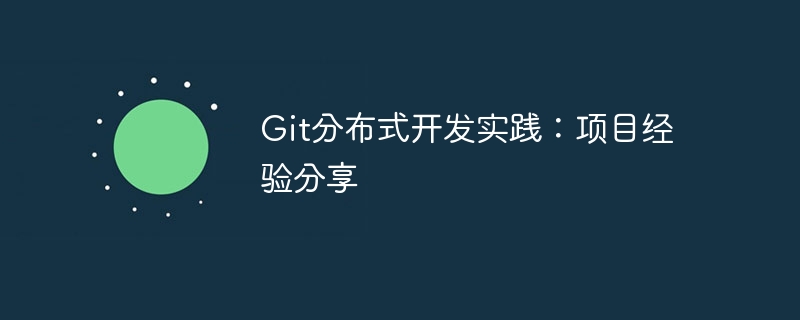

In recent years, with the rapid development of Internet technology, the field of software development has also ushered in tremendous changes. As a distributed version control tool, Git has gradually become one of the preferred tools for developers due to its excellent performance and flexible development model. In actual project experience, we have also deeply realized the various advantages of Git distributed development.
First of all, Git distributed development can greatly improve team collaboration efficiency. Whether a small team or a large project, all developers can work independently in a local repository and are free to commit their own changes without affecting the work of others. This means that developers can more freely control the progress of their own work and will not cause conflicts due to other people's operations. When everyone completes their tasks, they only need to push their changes to the remote warehouse. Others can easily obtain the latest code and proceed with the next step of development, which greatly reduces the complexity and time-consuming of team collaboration.
Secondly, Git distributed development protects the security of the code. Since each developer has a complete code base locally, even if unexpected situations occur, such as server downtime or accidental deletion, we can still recover from other developers' local libraries without causing data loss. . In addition, Git distributed development also supports the creation and management of branches. Each developer can develop and experiment in an independent branch without affecting the stability of the main branch. This branching model greatly facilitates innovation and experimentation, and is easier to manage and roll back.
Furthermore, Git distributed development provides a better code review and merge process. In Git, code review is a common development practice. Developers can invite other colleagues to conduct code reviews before merging the code to improve code quality and project stability. With Git's branching and merging capabilities, we can easily incorporate other developers' feedback and changes into our code, and display and share these updates across the entire team. This open and transparent code review and merge process not only strengthens team collaboration and communication, but also improves the overall code quality and project maintainability.
Finally, Git distributed development also provides a highly customizable workflow. In Git, we can customize different workflows based on specific project needs and team size. For example, you can use a branch development model to conduct functional development and bug fixing on different branches to ensure functional stability while repairing online problems in a timely manner. In addition, tags and milestones can also be used for version management, which facilitates version control and release management for developers and project managers. This customizable workflow can better adapt to the needs of different projects and improve development efficiency and project management flexibility.
To sum up, Git distributed development practice has shown many advantages in actual projects. It improves team collaboration efficiency and work environment flexibility, protects code security, provides efficient code review and merge processes, and supports highly customized workflows. In future software development, Git distributed development will continue to play an important role, helping developers improve work efficiency and create better software products.
The above is the detailed content of Git distributed development practice: project experience sharing. For more information, please follow other related articles on the PHP Chinese website!




